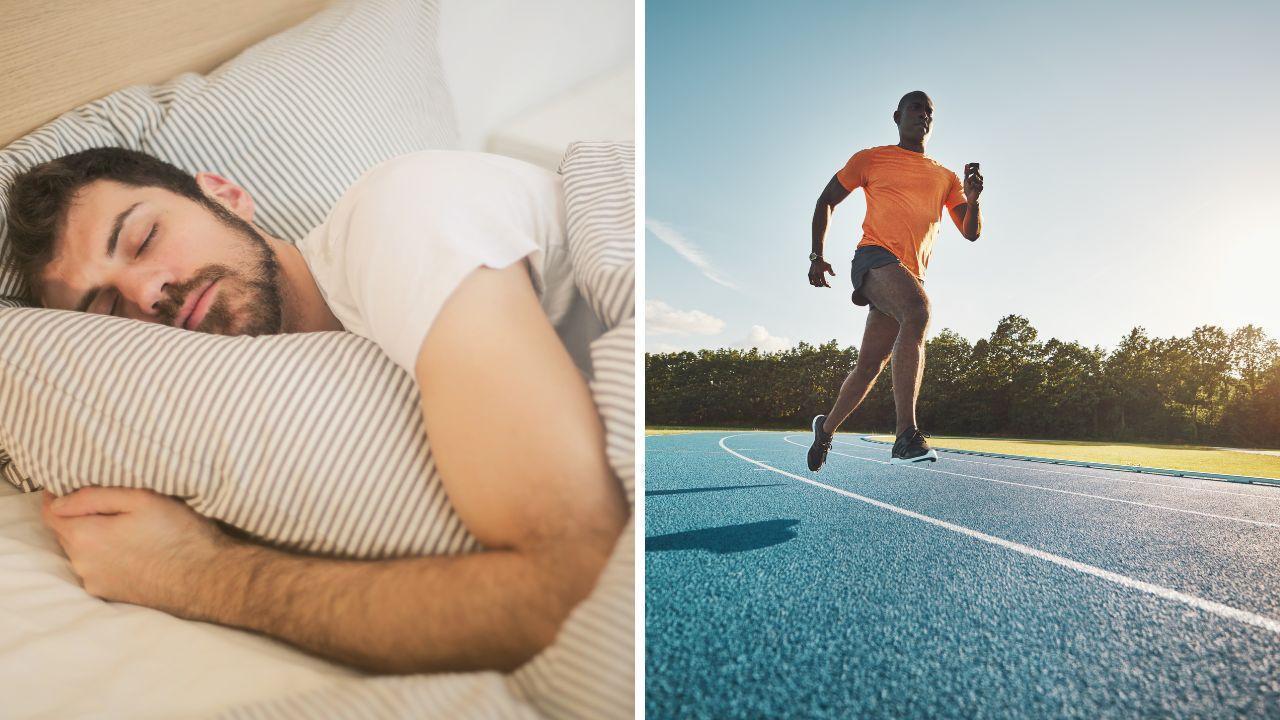
Post by: Vansh Kumar
When it comes to achieving peak athletic performance, most people think about rigorous training, proper nutrition, and effective coaching. However, one critical component often gets overlooked: sleep. Exploring the impact of sleep on athletic performance reveals that rest is not just a luxury—it's an essential part of any athlete's regimen. In this article, we will delve into how sleep affects your performance, the science behind it, and practical tips for optimizing your rest.
Sleep is a vital process that allows the body to recover, repair, and rejuvenate. During sleep, the body undergoes essential restorative processes, including muscle repair, protein synthesis, and hormone release. These processes are crucial for athletes, as they directly contribute to muscle growth, recovery from injuries, and overall physical performance. Research shows that a well-rested body can perform at its best, whereas sleep deprivation can lead to a decline in both physical and mental capabilities.
Additionally, sleep plays a significant role in cognitive function, which is essential for athletes. It enhances concentration, decision-making, and reaction times—key elements needed to excel in competitive environments. Studies indicate that lack of sleep can lead to decreased attention and impaired cognitive performance, both of which can be detrimental during competition. The relationship between sleep and performance is undeniable, and understanding this connection can help athletes unlock their full potential.
Exploring the impact of sleep on athletic performance uncovers several negative effects of sleep deprivation. Firstly, reduced physical performance is a significant concern. When athletes do not get adequate sleep, they experience fatigue, which can l ead to diminished strength and endurance. Research indicates that athletes who sleep less than the recommended amount often show decreased sprinting speed, strength, and overall athletic performance. This decline can be particularly alarming during crucial competitions when every second counts.
ead to diminished strength and endurance. Research indicates that athletes who sleep less than the recommended amount often show decreased sprinting speed, strength, and overall athletic performance. This decline can be particularly alarming during crucial competitions when every second counts.
Another critical aspect is the increased risk of injury associated with sleep deprivation. Fatigue impairs coordination and reaction times, making athletes more susceptible to accidents. A lack of focus, driven by inadequate rest, can lead to costly mistakes that could otherwise be avoided. In high-stakes environments, where precision is vital, this increased risk can have serious implications for an athlete’s career.
Moreover, inadequate sleep hinders recovery, an essential part of any training regimen. Sleep is vital for the body to heal from intense training sessions, and insufficient rest can prolong soreness and lead to diminished performance. Additionally, sleep regulates hormones that control appetite, stress, and recovery. Disrupted sleep patterns can lead to increased cortisol levels (the stress hormone) and decreased testosterone levels, both of which negatively impact an athlete’s performance and recovery.
Understanding how much sleep athletes need is essential for optimizing performance. While the amount of sleep required varies from person to person, research suggests that most athletes benefit from 7 to 9 hours of quality sleep each night. Some elite athletes may even require more, particularly during heavy training periods. The quality of sleep matters just as much as the quantity; uninterrupted, restful sleep is crucial for maximizing recovery and performance. It's vital for athletes to listen to their bodies and prioritize sleep as a fundamental part of their training regimen.

To help athletes improve their sleep quality, establishing a sleep routine is a crucial step. Going to bed and waking up at the same time every day helps regulate the body’s internal clock, promoting better sleep quality. Creating a sleep-conducive environment is also important; keeping the bedroom dark, quiet, and cool can significantly enhance sleep experiences. Comfortable bedding plays a critical role in this equation, contributing to a restful night.
Limiting screen time before bed is another effective strategy for improving sleep quality. The blue light emitted by screens can disrupt melatonin production, which is necessary for regulating sleep. Athletes should aim to avoid screens at least an hour before bedtime to help facilitate a more restful night. Additionally, paying attention to diet can significantly impact sleep quality. Avoiding heavy meals, caffeine, and alcohol close to bedtime can make it easier to fall asleep and stay asleep.
Incorporating relaxation techniques into the pre-sleep routine can also promote better sleep. Practices like meditation, deep breathing, and gentle stretching can help calm the mind and prepare the body for restful sleep. Regular physical activity is beneficial for sleep, but athletes should avoid vigorous workouts close to bedtime, as they may leave them too energized to rest properly. Monitoring sleep patterns through a sleep tracker can also help athletes identify areas for improvement and ensure they’re getting enough rest.
In addition to a good night’s sleep, naps can offer significant benefits for athletes. Short naps lasting 20 to 30 minutes can provide a quick energy boost and improve alertness and performance. For those looking to enhance recovery further, longer naps of up to 90 minutes allow for a complete sleep cycle, which can enhance cognitive function and physical recovery. Integrating naps into the training regimen can be a game-changer for athletes striving to maintain peak performance throughout the day.
This article explores the impact of sleep on athletic performance, highlighting why rest is essential for athletes. It explains that sleep helps the body recover, repair, and grow stronger. Athletes need about 7 to 9 hours of sleep each night to perform their best. Without enough sleep, athletes may feel tired, which can hurt their speed and strength. The article also points out that lack of sleep can lead to more injuries because tired athletes might not focus well. Good sleep helps the brain work better, making it easier for athletes to think clearly during games.
The article offers tips for improving sleep quality, like creating a cozy sleeping space and sticking to a sleep routine. It also mentions that short naps can give athletes extra energy during the day. Overall, the article reminds us that exploring the impact of sleep on athletic performance shows just how important sleep is for athletes who want to succeed. By resting well, athletes can stay healthy, recover faster, and play their best.
This summary is brought to you by the DXB News Network. The information in this article is meant to help readers understand the importance of sleep for athletic performance. Always consult a healthcare professional for personalized advice.
Sleep, Athletic performance, Rest, Recovery, Physical performance, Sleep quality, Sleep deprivation, Injury prevention, Cognitive function, Sleep routine, Nutrition, Endurance, Muscle repair, Mental focus, Napping, Training regimen, Hormonal balance, Fatigue, Athletes, Performance enhancement
#trending #latest #Sleep #AthleticPerformance #Rest #Recovery #PhysicalPerformance #SleepQuality #SleepDeprivation #InjuryPrevention #CognitiveFunction #SleepRoutine #Nutrition #Endurance #MuscleRepair #MentalFocus #Napping #TrainingRegimen #HormonalBalance #Fatigue #Athletes #PerformanceEnhancement #breakingnews #worldnews #headlines #topstories #globalUpdate #dxbnewsnetwork #dxbnews #dxbdnn #dxbnewsnetworkdnn #bestnewschanneldubai #bestnewschannelUAE #bestnewschannelabudhabi #bestnewschannelajman #bestnewschannelofdubai #popularnewschanneldubai

Explore how sports evolved from traditional games to modern competitions...Read More.

The UAE has sentenced three people to death for the terrorist murder of Israeli rabbi Tzvi Kogan, marking a rare violent incident in the country....Read More.













7 Free Ghibli-Style AI Image Editors to Try Now
Transform your images into Ghibli-style art with these 7 free AI tools. From dreamy landscapes to an

China Conducts Military Drills Near Taiwan
China's coast guard conducted patrols, inspections, and drills near Taiwan as Beijing announced mili

Man City’s Haaland suffers ankle injury, awaits tests
Erling Haaland picked up an ankle injury in Man City’s FA Cup win. He will see a specialist to asses

New E-Skin Enables Touchless Control and Robot-Like Sensation
Revolutionary e-skin mimics human touch, allowing touchless control, aiding robots, and helping peop

UAE to Launch Digital Dirham CBDC by Year-End for Secure, Efficient Payments
The UAE will introduce its Digital Dirham CBDC by year-end, enhancing security, transparency, and ef